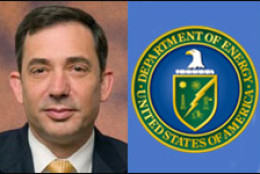Energy Department
-
Dr. Richard Carlin, director of the Navy's Sea Warfare and Weapons Department in the Office of Naval Research, outlines his organization's energy goals and the Navy's increasing investments in its Energy Excelerator program.
September 18, 2013 -
Eight cutting-edge technologies developed by the government are being shown off this week to venture capitalists and investors in Silicon Valley, with the hope of attracting someone to take the applications to market.
August 21, 2013 -
The Energy Department confirmed 14,000 current and former employees are at risk of identity theft as cyber attackers gained access to their personal information. This is at least the second hacking incident this year.
August 16, 2013 -
The Department of Energy detailed to House lawmakers Wednesday its plans to create a new undersecretary for management and performance and expand its undersecretary of science office.
July 25, 2013 -
Josh Silverman, director of the Department of Energy's Office of Sustainability Support, led a team that identified and eliminated 1 million tons of dangerous greenhouse gases that were being emitted from DoE facilities.
July 09, 2013 -
The Energy Department's Office of Environmental Management (EM) faced scrutiny in a hearing Thursday that questioned EM's contract management. DOE has been on the GAO's High Risk List for contract management since 1990.
July 01, 2013 -
The idea behind cyber threat intelligence is to understand more about the attack and the attacker than ever before by matching up patterns, anomalies and other characteristics of the bad guys. Energy, DoD, Commerce and DHS are all analyzing cyber attack data to develop this more complete picture.
April 25, 2013 -
In 2006, the service aimed to cut its fuel use by 10 percent. By 2012, it had reduced consumption by 12 percent.
March 22, 2013 -
The Department of Energy announced that 235 people will be laid off, and more than 2,500 will be furloughed for several weeks, as a result of automatic federal budget cuts.
March 20, 2013 -
Bob Osborn, the National Nuclear Security Administration's chief information officer, is leaving the government after more than 36 years of service.
January 17, 2013 -
OMB and NIST are seeking help from industry and academia on how to integrate cloud computing and the large amount of information that is created from mobile computing. The goal is not just to know what data agencies have, but the value the data brings. With all this focus on cloud and big data integration, could agencies be on the hook for a new "big data" strategy?
January 16, 2013 -
The General Services Administration issued two requests for information earlier this month to redevelop the FBI headquarters building and the area of Washington known as Federal Triangle South. Acting Administrator Dan Tangherlini said he's willing to entertain any and all ideas for saving the government money, making the buildings more efficient and helping to transform the neighborhoods.
December 21, 2012 -
Bob Brese, the agency's CIO, said cloud service and security operations center will help make the move to smartphones and tablet computers easier. December 20, 2012 (Encore presentation January 31, 2013)
December 20, 2012 -
Dr. A. Hunter Fanney talks about a house the NIST Engineering Lab is using to study green technologies. Dr. Cheryl Martin discusses the Energy Department's recent round of grants to foster new technology. Financial Planner Arthur Stein discusses the impact of FERS over the last 25 years. Pete Kasperowicz of The Hill newspapers reviews upcoming legislation on Capitol Hill.
December 12, 2012 -
Lawrence Korb of the Center for American Progress says sequestration may not be such a bad thing. Buddy Bland talk about upgrades to the Oak Ridge National Laboratory's supercomputer. Mark Russo of the FDA talks about food shortages caused by Hurricane Sandy.
November 06, 2012



